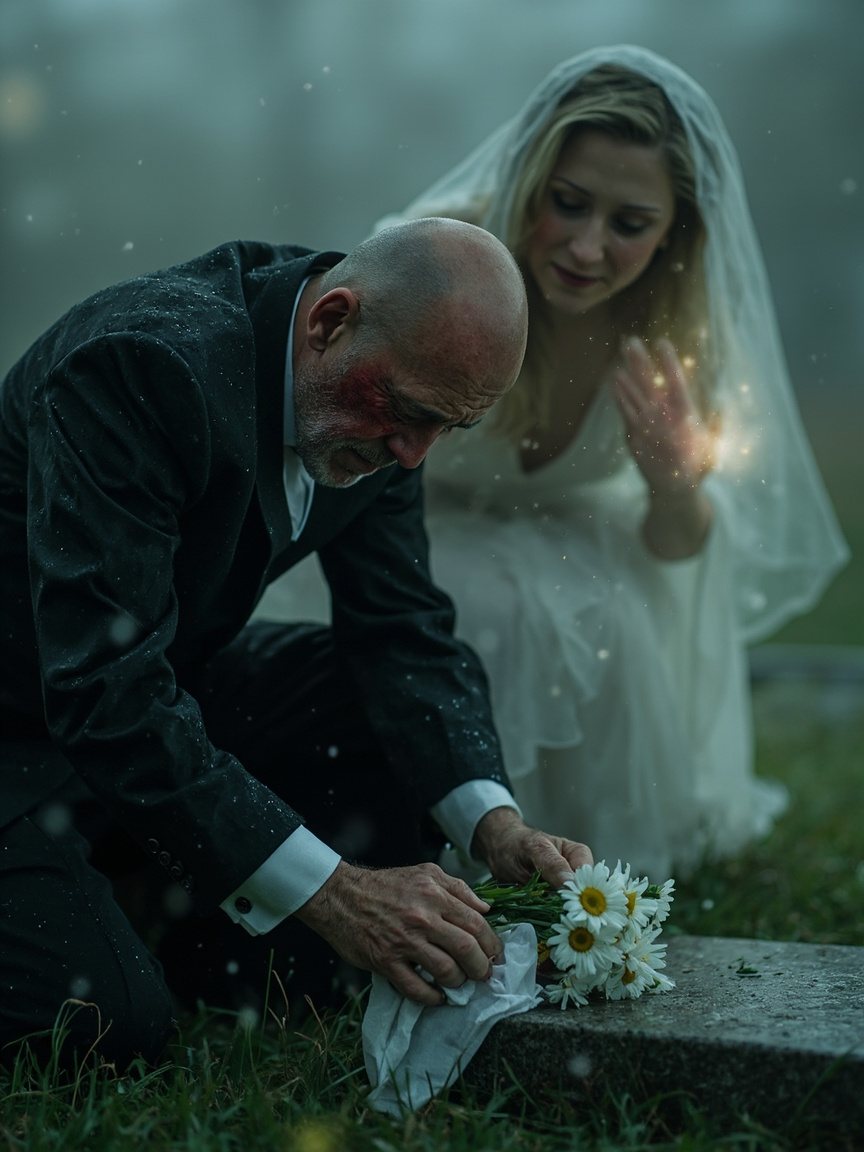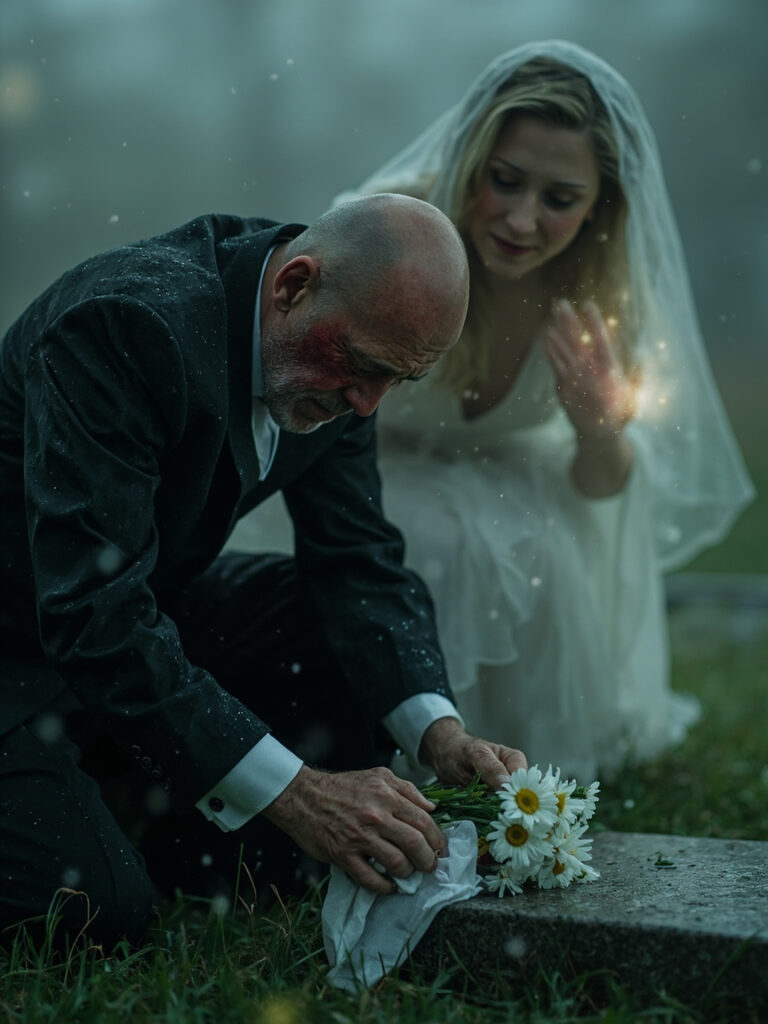The day before I married my new wife, I went to clean my late wife’s grave… Something unexpected happened there, and my life changed forever…
They say time heals everything. But four years after my wife Anna died, I was still sleeping on her side of the bed.
My name is Daniel Whitmore, and once upon a time, I believed in forever. Anna and I were married for nine years before a drunk driver ended it all on a rainy November night. Since then, my life has been a series of empty days.
I clung to her memory—the way she’d hum while stirring pasta sauce, the freckles on her nose that only showed under sunlight, the smell of her perfume lingering on the pillows. Remembering felt like the only way to keep her alive. Forgetting felt like betrayal.
For nearly three years, I lived like a ghost. Friends invited me out, my sister begged me to see a therapist, and my boss worried about my slipping performance. None of it mattered. I wasn’t interested in being “healed.” I thought healing meant letting her go.
And then I met Claire Donovan.
We met at a charity dinner my company sponsored. She was covering the event as a freelance writer. I noticed her because she didn’t ask shallow questions. Instead of “What do you do?” she asked, “Why do you care about this cause?” Her voice was calm, her presence steady. It felt like standing beside someone who wasn’t afraid of silence.
Coffee meetings turned into dinners, and dinners turned into long walks by the river. She never pressed me about Anna. But one night, she caught me off guard.
“You talk about her in the present tense,” she said softly.
I froze. No one had ever noticed.
“It’s okay,” Claire added gently. “It means she’s still part of you.”
Months passed. Slowly, I began living again. I started jogging, cooking, even laughing without guilt. Claire never tried to replace Anna. She simply stood beside the shadow she left.
After a year and a half, I asked Claire to marry me. She said yes, with tears in her eyes. For the first time in years, I felt hope.
But as the wedding approached, the old fear returned. Was I betraying Anna by marrying someone else?
The night before the wedding, I drove to St. Mary’s Cemetery with a bouquet of lilies—Anna’s favorite. Kneeling before her grave, rain soaking through my suit, I whispered:
“I’m sorry. I don’t know what I’m doing. I love her, but I still love you. How do I stop?”
My voice cracked. Thunder rolled in the distance. And then—behind me—a voice said:
“You never stop. You just learn how to carry it differently.”

I spun around. A stranger stood there, holding flowers.
The stranger’s words echoed in my head long after I left the cemetery that night. “You never stop. You just learn how to carry it differently.”
Her name was Elena. She had lost her brother in combat three years earlier, and she told me that grief had never left her—it had only changed shape. We talked for a while under the rain, two strangers bound by loss. When I finally drove back to my hotel, I was soaked through, but my heart felt raw, open in a way it hadn’t for years.
The next morning, sunlight streamed into the room as if nothing had happened. But inside, I was trembling. My tuxedo hung neatly pressed, my vows folded in my pocket. Everyone expected me to stand tall today, to prove that I was finally whole again. But I wasn’t sure I was ready.
At the chapel, guests filled the pews. My sister beamed at me from the front row, relief shining in her eyes. To her, this wedding meant closure. To me, it felt like standing on a bridge between two lives.
And then Claire walked in.
She wore a simple white dress that flowed like water. She wasn’t the kind of beauty that made the room gasp—she was the kind that sank into your bones and stayed there. Her eyes found mine, soft and steady, and for a moment, I almost believed I could do this.
The minister began. My palms were sweating. Then came the words I’d dreaded:
“Do you, Daniel Whitmore, take this woman to be your lawfully wedded wife, forsaking all others…?”
Forsaking all others.
Did “all others” include Anna? My chest tightened. My throat closed. The silence stretched. I could feel every pair of eyes on me, waiting. Claire squeezed my hand. She wasn’t panicked. She wasn’t angry. Her gaze told me she understood.
“I… I do,” I whispered at last.
The guests exhaled in unison. We kissed. The room erupted in applause. But inside me, there was no applause—only a war between guilt and relief.
That night, at the reception, Claire laughed and danced barefoot to the band’s music, radiant in her joy. I watched her and wondered if I had just made the most honest choice of my life—or the most dishonest.
Our honeymoon in Vermont was meant to be a new beginning. A cabin by a quiet lake, the trees painted in autumn colors—it should have been perfect. But silence, for me, was dangerous. Silence let Anna creep back in.
One morning, as we sipped coffee on the porch, Claire set her mug down.
“You’re not here with me, are you?” she asked softly.
I stared at the lake. “I’m trying.”
Her eyes searched mine. “Daniel… did you marry me because you love me, or because you were afraid of being alone?”
The words cut through me. She wasn’t angry, just heartbreakingly calm.
I swallowed hard. “I love you. I do. But sometimes it feels like part of me still belongs to her. Like I’m… borrowing myself from the past.”
Tears welled in her eyes, but she didn’t look away. “Then we need help. Because I can’t be someone’s consolation prize. And you deserve more than a life built on guilt.”
When we returned home, she made an appointment with a grief counselor. I didn’t want to go. But I went—for her. For us.
And that’s where I began to finally face the truth.
Therapy was nothing like I expected. I thought the counselor would tell me to move on, to erase Anna from my life. Instead, Dr. Weiss sat in her quiet office, surrounded by soft lamps and muted colors, and told me something that struck deep:
“Grief isn’t a problem you solve, Daniel. It’s a change in the way you love. The goal isn’t to let go of Anna. The goal is to make room for Claire, too.”
Her words stayed with me. For the first time, I wondered if my heart didn’t have to be a battlefield—maybe it could be a home with more than one room.
Weeks later, I found myself in my study late at night, surrounded by crumpled pages. I had been trying to write something—anything—that would help me untangle the knot inside me. Eventually, the words came in the form of a letter.
When Claire found me, I was hunched over the desk, tears smudging the ink.
“Who’s it for?” she asked gently.
I hesitated, then whispered, “Anna.”
Claire didn’t flinch. She didn’t walk away. She just nodded. “Do you want me to stay?”
I nodded. And then, with shaking hands, I read the letter aloud.
Dear Anna,
I’ve spent four years trying to live without you, but the truth is, I never really tried at all. You were my compass, my safe place, my forever. When you died, I thought love died with you.
Then I met Claire. She came into my life when I was empty. She never asked me to stop loving you—that terrified me, because if I let her in, I thought it meant betraying you.
But I understand now. Love doesn’t compete. It expands. You taught me how to love. Claire is teaching me how to keep loving, even after loss. I believe you’d want that for me.
I will always carry you. But I’m ready to carry her, too. Thank you—for everything.
With love always,
Daniel.
When I finished, Claire’s cheeks were wet with tears, but she was smiling. She reached for my hand.
“I don’t want you to forget her,” she whispered. “I just want you to love me too.”
I broke then—truly broke, in the best way. Years of guilt poured out of me as I cried in her arms. For the first time since Anna’s death, I felt like I could breathe again.
A year later, Claire and I stood together at Anna’s grave. The sky was a soft, forgiving blue. I placed lilies on the headstone, then stepped aside as Claire knelt.
“Thank you,” she whispered, touching the marble. “For teaching him how to love. I promise I’ll take good care of him.”
Tears blurred my vision, but for once, they weren’t only tears of grief. They were gratitude. Anna wasn’t my ghost anymore. She was part of my story, part of why I could stand here now with peace in my heart.
Months later, Claire and I welcomed our daughter, Grace. When she was old enough to ask, we told her the truth:
“Your father once loved a wonderful woman named Anna. She’s in heaven now. And because he loved her, he learned how to love us.”
Sometimes, late at night, I still dream of Anna. She’s always smiling, never sad, as if to say she’s okay. I wake up, turn to Claire sleeping beside me, and realize I don’t have to choose between them.
Because love isn’t something you move past.
It’s something you grow around—until it becomes the reason you can love again.


